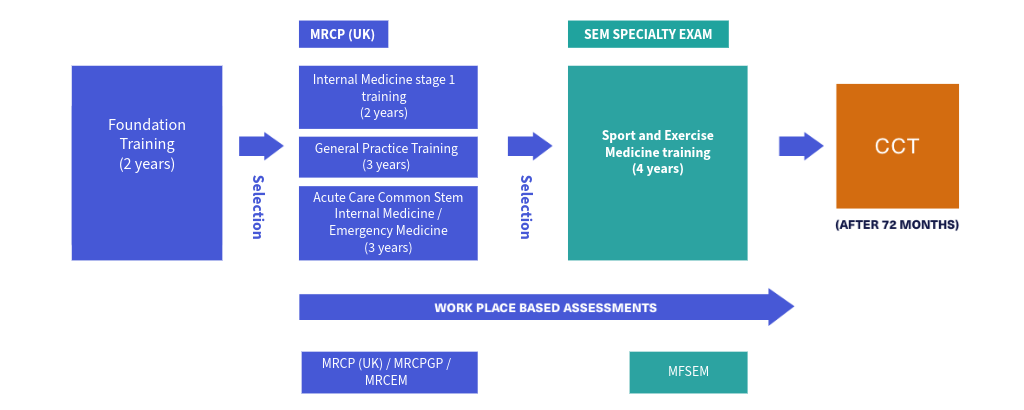Training Pathways
Sport and Exercise Medicine professionals need a wide range of clinical skills and a good understanding of human motivation.
A flexible approach and the ability to work as part of a multidisciplinary team will get you off the starting blocks if you are interested in a career in Sport and Exercise Medicine.
Those wishing to gain Fellowship, FFSEM, can enter into Sport and Exercise Medicine (SEM) Higher Specialty Training following the successful completion of both a medical foundation programme and a core training programme.
THE TRAINING PATHWAY
The following will take you through the pathway for Higher Specialty Training (HST) in Sport and Exercise Medicine:
Graduate from medical school
Undertake Foundation Training years
Choose your pathway to specialist training:
1. Core Medical Training (CT1-2)
2. Acute Care Common Stem (ST1-2)
3. Complete General Practice Training
Once you have completed one of the above, apply for a Specialist Training post in Sport and Exercise Medicine at ST3 level.
Sport and Exercise Medicine Higher Specialty Training takes 4 years. By ST5 the trainee must have completed the SEM Specialty Exam.
Once you have completed Specialist Training and gain a Certificate of Completion of Training (CCT), as a Consultant, you can join the GMC specialist register and become a Fellow of the Faculty of Sport and Exercise Medicine.

Further information about the specialty and the application process can be found on the JRCPTB specialty overview page.
PosTgraduate Courses in SEM
The FSEM Membership Exam in Sport and Exercise Medicine is the path to Membership and Fellowship of the FSEM, however doctors interested in SEM may wish to complete a postgraduate course first and can find information below. Here you will find links to MSc/Postgraduate courses in SEM in the UK and Ireland. This non-exhaustive list is for informative purposes only and the FSEM does not oversee or endorse these courses.
University of Bath – MSc Sport and Exercise Medicine
University of Bath – PG Dip Sport and Exercise Medicine
Cardiff Metropolitan University – MSC/Postgraduate Diploma in Sport and Exercise Medicine
Trinity College Dublin – Msc in Sports and Exercise Medicine
University of Glasgow – Msc Sport and Exercise Science and Medicine
Leeds Beckett University – MSc and PG Dip in Sport and Exercise Medicine
University of Leeds – MSc Sport and Exercise Medicine
University College London – MSc and Postgraduate Diploma in Sports Medicine, Exercise and Health
Queen Mary University of London – Msc/Postgraduate Diploma in Sport and Exercise Medicine
Loughborough University – MSc Musculoskeletal Sport Health and Science
Manchester Metropolitan University – MSc/PGDip/PGCert Sport and Exercise Medicine
The University of Nottingham – MSc Sports and Exercise Medicine
The University of South Wales – MSc Sports and Exercise Medicine
Newcastle University – Exercise Biomedicine BSc Honours
Trinity College Dublin – Online Postgraduate Certificate in Clinical Exercise
Sport Promote/UEFA – Trauma and Emergencies Aid Course
University of Exeter – MSc Sport and Exercise Medicine
Visit our events page for information on short courses, conferences and events relevant to SEM.
Additional Guidance
FAQ’s for overseas doctors
See below the information and frequently asked questions for overseas doctors aspiring to train or work in the UK.
Your first point of contact should be the UK General Medical Council (GMC) for advice on working as a doctor in the UK.
Entry into Higher Specialist Training in SEM in the UK is coordinated by the Joint Royal Colleges of Physicians Training Board (JRCPTB). Entry into SEM training is possible after successful completion of a foundation training programme and a core training programme – see above for description of the training pathways.
Check the GMC website for advice on working as a doctor in the UK. Currently, overseas trained doctors may consider getting their training recognised through the GMC through the CESR route to demonstrate competence in the UK SEM curriculum competencies.
No, completing the SEM Specialty exam with the Faculty does not provide GMC registration on the SEM Specialist Register, that can only be done through CCT or CESR.
No. SEM training in the UK is usually a 4 year training programme where candidates undergo training in line with the SEM Curriculum.
Further Reading
The GMC website contains guidance on how to register to train or work in the UK.
The British Medical Association (BMA) also offers guidance for International Medical Graduates looking to train or work in the UK.

